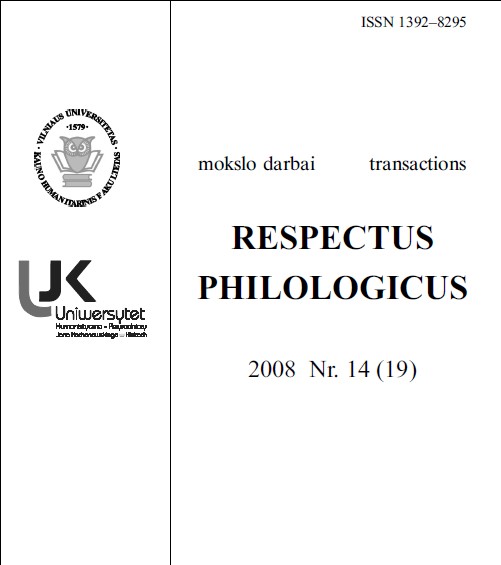EKSTREMALŪS VERTIMO SPRENDIMAI
EXTREMES OF TRANSLATION DECISIONS
Author(s): Vytaute PasvenskieneSubject(s): Metaphysics, Hermeneutics, Translation Studies, Theory of Literature
Published by: Vilniaus Universiteto Leidykla
Keywords: ‘domesticating’ and ‘foreignizing’ translation; extra-linguistic nature; instrumental and hermeneutic concepts of language;
Summary/Abstract: This study is an attempt to disclose developmental directions of basically different translation tendencies, priorities, standpoints and aims. First, the article discusses the conceptual intricacy of the term translation and the complex position of the translator as an invisible link between the two poles of the binary. Second, it is contemplated how translation can highlight or hide cultural boundaries and, thus, shift cultures and often traditions to far away territories or, by creating socio-cultural oppositions, serve as a way making an individual to comprehend cultural differences. Finally, it is illustrated the kind of influence the translator is likely to exert on the translation result. As an example, two literary translations accomplished by Vladimir Nabokov are commented. They are Alices’ Adventures in Wonderland by Lewis Carroll and Evgenij Onegin by Alexandr S. Pushkin. The contemporary translation theory rests on two different assumptions about language use: instrumental and hermeneutic concepts of language. These opposite backgrounds gave rise to the development of two competing models of translation which are seen as ‘domesticating’ and ‘foreignizing’ tendencies of translation. Translation always encounters problems of extralinguistic nature and, as a social act, it implies social relations, which can be either adapted or simply shifted to the environment of another culture. Metaphysics of communication, which defines translation as a process of homogenization and of establishing equivalence and which is inherent in conventional conception of translation, often appears questionable.
Journal: Respectus Philologicus
- Issue Year: 2008
- Issue No: 14 (19)
- Page Range: 167-176
- Page Count: 10
- Language: Lithuanian

